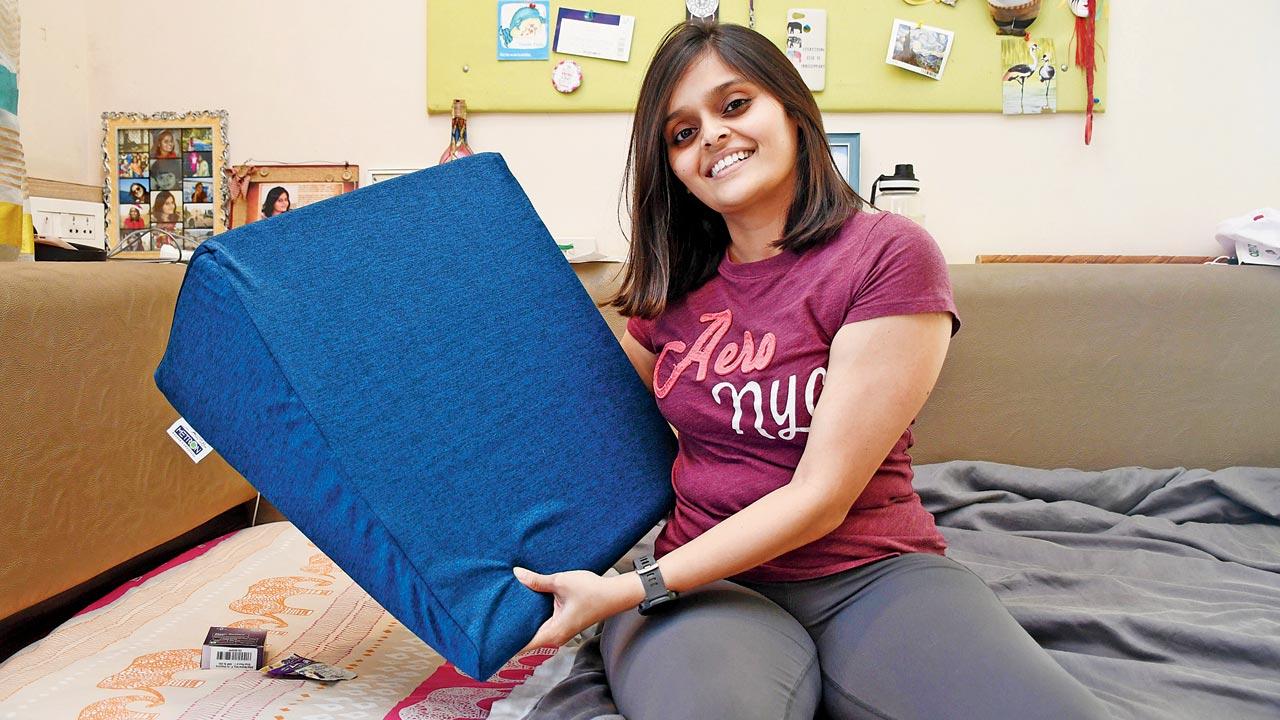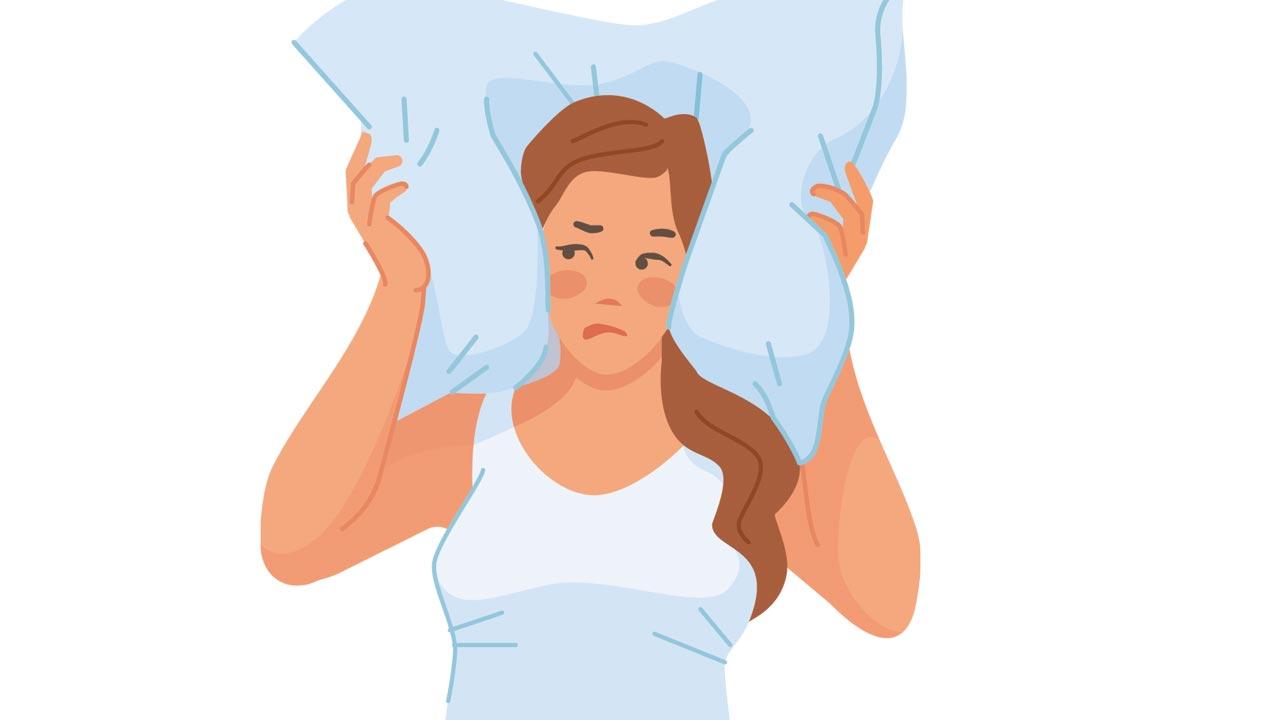Sedatives are so 90s and for those who go to ‘doctors’. The new-age insomniac is 20, with no time to seek a prescription, hopping across to the lifestyle store for gummies and tongue melts that promise a good snooze

Parel resident and nutritionist Apoorva Joshi, 33, struggles with deep sleep due to asthma and stress, using melatonin supplements as an SOS. If the dosage is correct, she says, chances of side effects are few. Pic/Ashish Raje
The city that never sleeps is finding it harder to do so since COVID-19 came over for an extended sleepover. One of the long-term side-effects of the viral infection, and the stress put by the pandemic on the economy and personal lives, is the loss of sleep. And to lull Mumbaikars, the market has recently been flooded with solvable powders, tablets, melts and gummies that promise to put you to sleep. Nestled in the lifestyle section of pharmacies, these lively little packets can be bought without a prescription—a fact that worries medical practitioners—and used without regulation.
ADVERTISEMENT
The sleep industry in India is valued at Rs 12,000 crore, according to S Sundaresan, the secretary of the Indian Sleep Products Federation (ISPF). However, that takes into account only mattresses. Bengaluru-based Vinti Rijhwani, founder-CEO of Vi and Ash, a company that claims to bring wellness into people’s lives with “proprietary, scientifically formulated, 100% vegan nutraceutical gummies”, pins the sleep supplement market at Rs 16,000 crore, taking into account that one in every three persons has trouble snoozing. And the problem has only worsened during the pandemic. ISPF’s data establishes that more than 40 new brands entered the market during the pandemic, and accessories such as pillow covers, quilts, sleep bags, calming pillows, weighted blankets, etc. are becoming commonplace.
 Dr Parul Tank, consultant psychiatrist
Dr Parul Tank, consultant psychiatrist
Manasa Garemella, co-founder of Kindlife that hosts many sleep supplements, says, “As per the Sleep Foundation, 10 to 30 per cent of adults and 30 to 48 per cent of older adults suffer from insomnia.” Findings of a pan-India survey by Bengaluru-based sleep products brand Wakefit.co in 2018 confirmed that sleep was a widespread lifestyle concern in cities. Kind Life stocks brands such as What’s Up Wellness, Power Gummies, Setu, Himalayan Organics, Panchamrit and Pure Nutrition that are vegan, and have other benevolent qualities.
The two hero ingredients in most sleep aids are melatonin and L-theanine. The former is a hormone secreted by our pineal gland at night, and also found in plants; the latter is an amino acid. Bolstering their properties are benign ingredients such as extracts from chamomile flowers, valerian root, mulberries, green tea, or silk protein. Overuse of melatonin can leave you groggy in the day, and doctors advise against doing high concentration tasks such as driving or operating heavy machinery while on it. Here’s the loophole: A doctor’s prescription is needed to procure any tablet or supplement carrying over 30 mg of melatonin. These gummies and supplements keep it well under 10 mg, and are a salve to many young professionals struggling to enter the dreamy dream land. “These are non-habit forming, reduce stress, relax the mind and also improve sleep cycle,” claims Garemella.
 Parel resident Apoorva Joshi uses a special pillow to elevate her head to alleviate her asthma, and also takes a melatonin supplement to sleep better. Pic/Ashish Raje
Parel resident Apoorva Joshi uses a special pillow to elevate her head to alleviate her asthma, and also takes a melatonin supplement to sleep better. Pic/Ashish Raje
Purvi Rambbhiya has had trouble sleeping for five odd years. “I’d get only about four to five hours of sleep a night,” says the 31-year-old. She put it down to work stress and anxiety, like we all do. The managing partner of a brand strategy consultancy, Two Consultants, then cultivated a sleep hygiene routine: Dimming the lights of the room an hour before sleeping, putting the phone away, and natural remedies such as sipping on moon milk. “What helped me were key vitamin supplements that a nutritionist prescribed,”
she says. Rambbhiya also occasionally drinks Sleep Like a Baby by Cosmix “which is really helpful when I am struggling to sleep.” She has been taking it for six months, and had no side-effects to report yet. Its website says it’s a plant-based, pre-bedtime drink mix that helps reduce sleeplessness and morning grogginess.
Apoorva Joshi is a nutritionist. The 33-year-old has been tossing and turning in bed for three years. “I get five to seven hours of sleep, but very little deep sleep,” says the Parel resident. Four to five hours of deep sleep or low wave sleep is essential for restoration and repair of the human body. Asthma, anxiety and stress were her instigators, and she stayed away from caffeine in the second half of the day, elevated her head to ease the asthma and started using an inhaler. She says, that the inhaler and melatonin proved to be the most helpful; the former is a permanent measure while the latter is an SOS. “Melatonin is a hormone made from serotonin and it controls our sleep-wake cycle,” she says. “It generally rises in the absence of ambient light, and gets suppressed in the presence of bright light. Eggs, fish, nuts, and mushrooms contain it.” Joshi also prescribes melatonin supplements to clients and vouches, “It is generally regarded safe for use if the dosage is correct. Some of the side-effects are headache, dizziness, drowsiness in the day,” and adds, “it is best to check with a doctor or nutritionist before starting it.”
 According to experts, one in every three people have trouble getting sleep. As per the Sleep Foundation, 10 to 30 per cent of adults and 30 to 48 per cent of older adults suffer from insomnia
According to experts, one in every three people have trouble getting sleep. As per the Sleep Foundation, 10 to 30 per cent of adults and 30 to 48 per cent of older adults suffer from insomnia
This is where the doctors are concerned. “Sleeping pills are not to be taken over the counter,” says Dr Paritosh Baghel, a senior consultant for Internal Medicine at SL Raheja Hospital in Mahim, “They have the potential for addiction, and if you stop taking them, you could have rebound insomnia. It also, potentially affects any other medication the patient is on.” He warns of day drowsiness. “You could doze on the footboard of the local train [you take to work],” he says, and also worries about depression or respiratory issues that can be caused by overdose. Then there’s the presence of these pills in the house that increases suicide potential.”
“One of the long-term effects of COVID-19,” says Dr Sanjith Saseedharan, who heads critical care at Raheja Hospital, “as we are finding out, is insomnia.” Where he used to have one patient in five days complaining of the ailment, he now comes across four to five a week. Dr Saseedharan confirms that melatonin does not need a prescription and does not come under scheduled drugs. But he also warns against dizziness, and that it cannot be taken lightly by those already suffering from kidney or liver issues, and pregnant or lactating women.
 Dr YongChiat Wong, Dr Paritosh Baghel and Purvi Rambbhiya
Dr YongChiat Wong, Dr Paritosh Baghel and Purvi Rambbhiya
Though it may not be directly harmful, psychologists and psychiatrists worry about dependency and increasing threshold through regular use. Of the 70 to 80 people psychologist Japneet Anand sees a week, 30 per cent complain of sleeplessness. Leaning on an over-the-counter gummy distracts you from the core problem—stress. “Stress is a broad spectrum,” says the Khar-based professional, “It covers work, health, family life, mental health—all of these need to be worked on individually.”
This is a concern for Dr Parul Tank, too. “Whatever you take over the counter can become addictive,” says the consultant psychiatrist at Fortis Hospital in Mulund.
“Insomnia could be a symptom of depression or anxiety disorder. It can also be a symptom of physical disorders such as hormonal or metabolic imbalance, diabetes, and hypertension.” Not to mention that it accompanies physical pains such as urinary tract infection. “It may also be caused by another medicine you are taking,” she says. Thus the dosage, frequency and time period to be followed needs medical regulation. “And regular use could build tolerance. If 3 mg of melatonin doesn’t work, you take more. I have patients who cannot sleep with even 10 mg dosage,” she adds. “So, by the time they come to me, I have to first work on the addiction and then get to the core issue.”
 Maitreyi Bhatia has had trouble sleeping since 2018. She was diagnosed with generalised anxiety disorder but the prescribed medication made her groggy. Now, she takes sleep gummies on hard nights. Pic/Atul Kamble
Maitreyi Bhatia has had trouble sleeping since 2018. She was diagnosed with generalised anxiety disorder but the prescribed medication made her groggy. Now, she takes sleep gummies on hard nights. Pic/Atul Kamble
But for some, the colorful—and tasty—gummies do what medication cannot. Like for graphic designer Maitreyi Bhatia who has had trouble sleeping since 2018, clocking four to five hours of disturbed sleep on a good night; two to three on others. The 26-year-old was diagnosed with generalised anxiety disorder, and prescribed medication—Melzap and Alprax—which made her drowsy through the day. “Even the process of getting off those medicines was quite tough,” says the South Mumbai resident, “But the doctor prescribed CBD and melatonin, which helped me. She now takes gummies from Nuto wellness “only on the nights I feel very anxious or charged up. Melatonin and CBD have never had any adverse effects on me,” she says.
Though all the experts we spoke to agree that melatonin is a non-addictive substance, supervised usage is advised. A fact highlighted by the makers as well. “Because the body-produced and ingested melatonin is broken down naturally,” says Dr YongChiat Wong, Group Head and Scientist, Medical and Technical Affairs at P&G “no studies have reported any dependency or tolerance build to the oral supplementation of melatonin.” They produce Vicks ZzzQuil NATURA gummy that contains melatonin and Vitamin B6 to relieve fatigue, and advise a trip to the doctor “if you are experiencing long-term sleep difficulties to treat any underlying causes.”
 Mitali Tandon’s Morning Fresh has three variants of sleep aiding dissolvables, one for first-time users, another for those with chronic complaints
Mitali Tandon’s Morning Fresh has three variants of sleep aiding dissolvables, one for first-time users, another for those with chronic complaints
Mitali Tandon heads Morning Fresh, which has three variants of sleep supplements that come in sachets—Restful Sleep, Deep Sleep and Beauty sleep. They researched the market in 2021 and the 350 to 400 people they spoke to across the country complained of irregular sleep cycles and disturbed sleep. They launched the product at the end of 2022. Restful Sleep is for first-time users, or those suffering from jetlag, etc. Deep Sleep is for those with long-term issues; Beauty Sleep also contains biotin for skin, hair and nail health.
“We ensure that there’s no sugar or anything physically addictive in the product,” says Tandon. “Our ingredients come under Food Safety and Standards Authority of India (FSSAI) regulation.” They are clear that their products fall in the lifestyle space, and not for those clinically diagnosed with insomnia. They also target the age group between 18 and 40 years, as those in the 45 to 55 range would have pre-existing conditions such as diabetes or high cholesterol.

Rijhwani’s Sleep Plus gummies come with the instruction that they are to be taken sporadically when needed. “If you take it for six weeks, it regulates the sleep cycle,” she says. “While we have tried to eliminate grogginess [with this product], each body is different.” They also advise the bare minimum dosage.
Rijhwani and her mother both suffered from bad sleep; she since her teens. It only got worse when she joined the team of a competitive food delivery app in the early years of her career. “It was the fastest growing unicorn start-up,” she says, “and nobody wanted to be left behind. I worked 14-hour days for two years.” Her weight dropped to 46 kilos and her body could not take it anymore.
She took melatonin tablets over the counter to get a shut-eye. “I did not take the prescription route,” she admits. “The melatonin tablet did not make me feel great. I woke up groggy and would need at least two hours to wake up properly. I also drank more coffee to function.”
The answer was closer home: Her family runs a 30-year-old pharmaceutical business. Her gummies contain over 20 ingredients, with three to four active ones, but 10 mg of melatonin is the star worker. In the FAQ section of her website, she advises a dosage of one gummy a day, and even two if that doesn’t help. If that doesn’t work, she advises a visit to the doctor.
Maybe that’s the place to start at, not end up in.
40
No. of new brands promising better sleep that entered the Indian market since the pandemic broke, according to Indian Sleep Products Federation data
Rs 12,000 CR
What the sleep industry in India is valued at according to S Sundaresan, secretary, ISPF
 Subscribe today by clicking the link and stay updated with the latest news!" Click here!
Subscribe today by clicking the link and stay updated with the latest news!" Click here!







